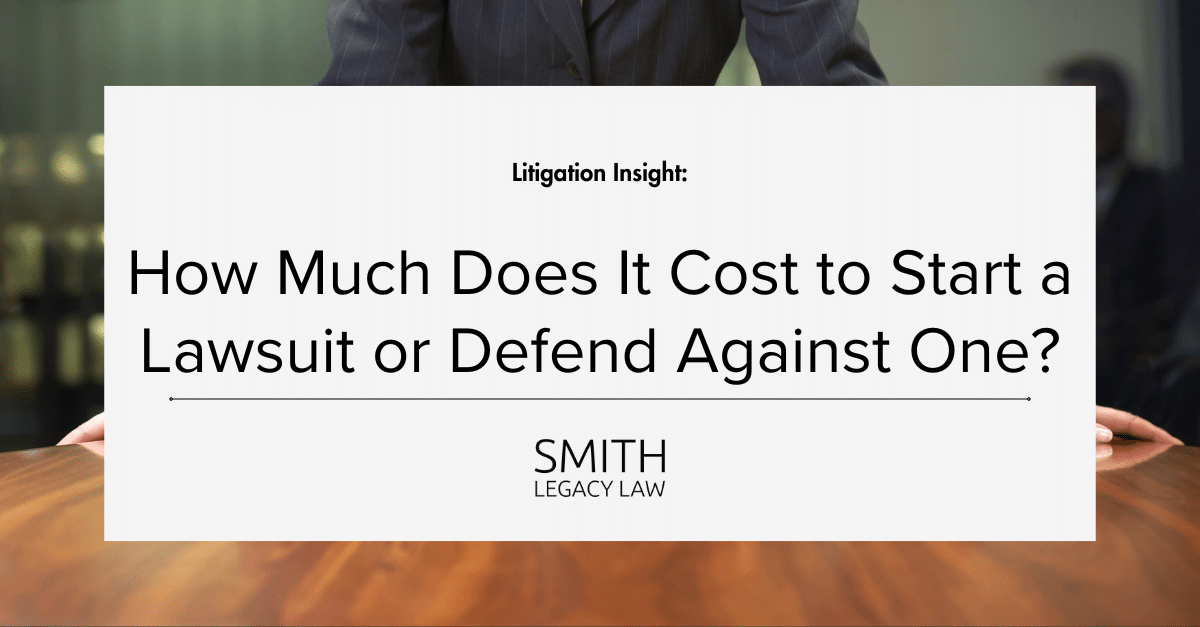The cost to start a lawsuit or defend against one is an important consideration in deciding how to respond to a dispute. Litigation can be expensive and time-consuming and sometimes you may pay more in court costs, legal fees, and other expenses than you may ultimately receive if you win the case. Before you start a lawsuit or respond to one, you should speak with your attorney about the costs you may incur, your budget, and the likelihood of success. Armed with this information, you can make well-informed choices about when to pursue litigation versus settlement or another form of alternative dispute resolution.
How Much Will You Pay in Legal Fees in a Lawsuit?
Most lawyers charge an hourly rate for litigation which varies greatly depending on the type of case, the complexity of the matter, and the experience of the attorney. However, contingency fees may be available in certain situations.
With a contingency fee, your attorney is paid from the proceeds of what you recover in the lawsuit. It is usually used in personal injury cases and sometimes in breach of contract matters where it is fairly certain that the plaintiff will recover. Fees typically start at 33% of the proceeds but may go higher for cases where there is a high risk of losing or the case is unusually complicated. There may also be higher fees where the attorney agrees to provide additional services, such as handling an appeal of a final judgment. Since the lawyer gets paid out of the final damage award, this arrangement is generally only available to plaintiffs, unless a defendant brings a counterclaim or cross-claim.
Some attorneys offer fixed fee or hybrid fee arrangements. Typically, fixed fees apply to cases involving fairly predictable work, so attorneys know from experience how long the work will take and can charge accordingly. Hybrid fees are when the attorney charges an hourly rate for some types of activities and a fixed fee for other ones in a case, or a reduced hourly rate coupled with a reduced contingency fee.
How much you will pay in legal fees also depends on the cooperation and responsiveness of both you and your opponent and the attorneys involved.
Can You Reduce Costs in a Lawsuit?
There are several ways that you can reduce how much your case will cost to litigate. Using alternative dispute resolution methods, such as mediation or arbitration, or negotiating a settlement, can save significant time and expense. This is true even if only certain issues in the dispute are resolved without the need for litigation.
Another tactic is to utilize nonlegal professionals to handle work that is not specifically legal in nature. While clients will often pay their attorneys to handle tasks such as conducting factual investigations and gathering documents, these tasks could also be done by a nonlawyer, likely at a lower cost. Care should always be taken to protect the confidentiality of information when working with nonlawyers, but your attorney can advise you on how to proceed.
Limiting motion practice and unnecessary discovery also can reduce legal fees. Some litigants think they should be aggressive about filing motions asking the court to intervene on some issue that could be resolved without a judge. Or they request that their opponent produce voluminous documents or numerous witnesses to prolong discovery when that information is not truly needed. This type of behavior drives up legal fees for both plaintiffs and defendants.
Importantly, you should ensure that you have an attorney that will keep fees in mind when you start a lawsuit. Your lawyer should explain the costs and benefits of pursuing a certain strategy or legal argument, and you must be clear on your priorities and willingness to compromise.
Should You Litigate Your Case?
Cost is one of many factors that you should consider before deciding to litigate. Our experienced litigation team can help you assess which path is most likely to result in a positive outcome and will represent your interests no matter what path you choose to take. Contact us for a consultation.
